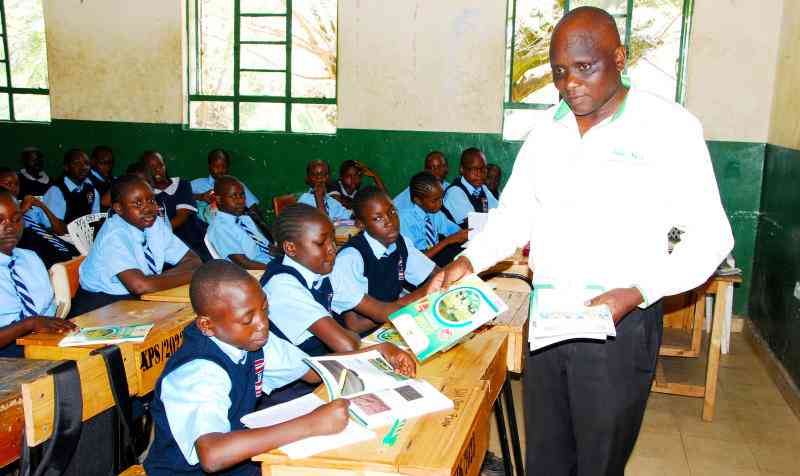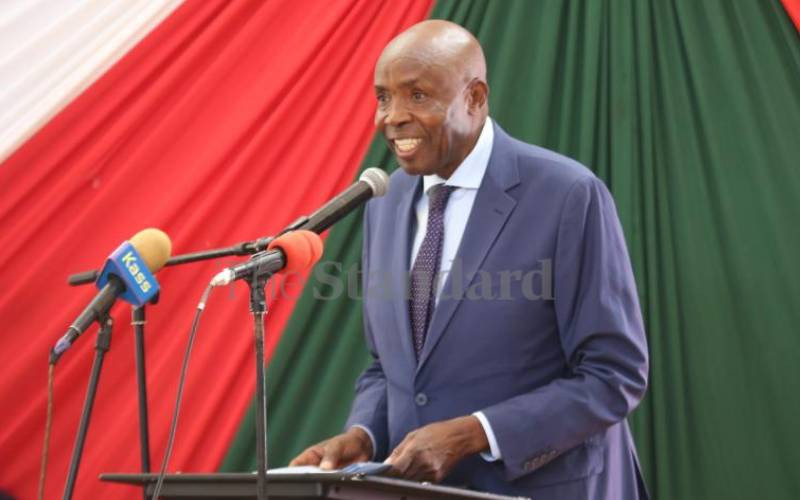
The Ministry of Education has dismissed a push by a section of stakeholders who sought to have the final grade of the CBC moved to secondary schools.
This effectively means that the pioneer class of the Competency Based Curriculum (CBC) will remain in their current institutions next year when they transition to Grade 9.
It will also end the uncertainty and anxiety over a possible move of the finalist class.
Basic Education Principal Secretary Belio Kipsang on Wednesday dismissed concerns that junior schools are not adequately prepared to host the Grade 9 learners.
Despite admitting that the transition will be painstaking, the PS disclosed that they have initiated the construction of 16,000 classrooms that will be used to accommodate the Grade 9 learners.
- .
Keep Reading
- DP Gachagua warns teachers against sending home students over fees

- Big divide in JSS rollout as public schools struggle to teach learners

- Puzzle of 175,748 students who dropped out of secondary school

This means that the government has eight months to prepare for the transition.
‘‘We are prepared for our children to be in Grade 9 next year. We are initiating the construction of 16,000 classrooms, it will be a marathon and Kenyans are not scared of a marathon,’’ Kipsang said.
He spoke at the Kenya Institute of Curriculum Development (KICD) during a stakeholders engagement on the preparation for Senior School and revamping of teacher education.
According to the PS, the decision to domicile Junior School in primary schools reflects the wishes of education stakeholders during consultations by the Presidential Working Party on Education Reforms.
‘‘Ninety-three per cent of Kenyans decided through the Presidential Working Party that we are domiciling Junior School in our primary level, we are not about to change that because we even don’t have a window to do that,’’ he said.
The ministry’s decision now frustrates the push by a section of stakeholders who sought for the transfer.
Last week, parents put forth fresh demands to move Grade 9 learners to secondary schools next year.
This would mean a significant departure from the government’s current approach where all three junior secondary school grades (Grades 7, 8, and 9) are domiciled in primary school.
Silas Obuhatsa, National Parents Association chairman, raised fears that hosting the institutions in primary schools risks watering down the implementation of CBC.
Stay informed. Subscribe to our newsletter
Obuhatsa says the preparations of the current schools that host Junior School are not sufficient for the anticipated demands of Grade 9.
He argues that the schools will have an intake of Grade One learners and the institutions need extra classrooms for the finalist class.
‘‘Is the government able to construct 15,000 classrooms between now and next year,’’ wondered Obuhatsa noting this is the projected number of classrooms needed ahead of the transition. Obuhatsa said the absence of Form One admission in secondary schools next year will mean some classrooms will be vacant, providing adequate space for the students.
In February, the Kenya Union of Post Primary Education Teachers (Kuppet) called for a split of junior secondary into two and domicile the learning levels in both primary and secondary schools. Under this plan, Kuppet wants Grade 7 and 8 learners to remain in primary school, while Grade 9 move to high school.
“Time is still there to make amends, the way forward is to ensure that Grade 8 is pushed to secondary school, let us grapple with challenges in Grade 7 which is domiciled in primary school,” said Akello Misori, Kuppet’s secretary general.
The union argues that the one-year implementation of the junior secondary school has been “terribly corrupted” and plagued by numerous problems, and should be discontinued,’’ noted Obuhatsa.

